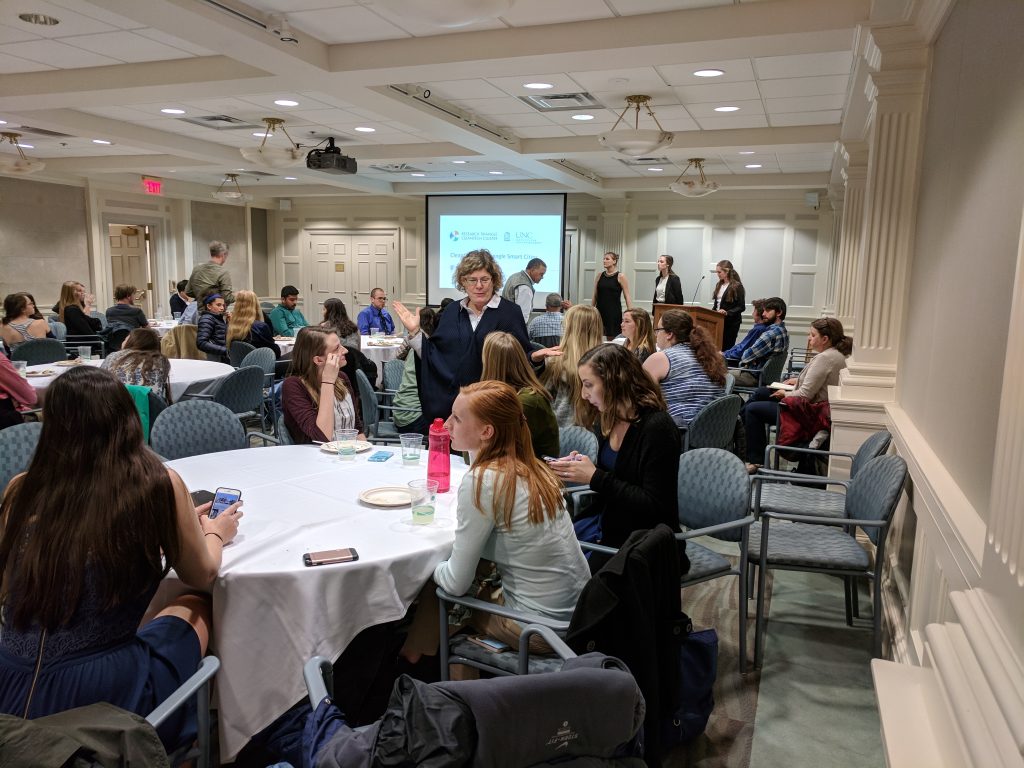Capstone program gives undergraduates research, consulting experience
January 6, 2024
In December, undergraduate students in the environmental capstone program presented at the Capstone Showcase where the UNC campus, community members and clients came to hear about the innovative research and recommendations the students worked on over the fall semester. Environmental capstone courses give students direct experience in their field by immersing them in real projects with real clients on real environmental research questions.
Because students are working with a variety of clients, the projects run the gamut of environmental issues from food, to water and air quality, environmental restoration, environmental justice, sustainability, climate change, smart cities and beyond. The clients and topics change from semester to semester. The environmental capstone program is administered by the Curriculum in Environment and Ecology with assistance from the UNC Institute for the Environment. Each of the fall field sites also hosted a showcase event in their respective cities in the Highlands, Morehead City and the Outer Banks. See a full listing of capstone final reports and presentations.
“For many students, it is their most rewarding class,” said Brian Naess, the capstone program coordinator and GIS analyst at the Institute. “Capstones let them delve deeper into a subject than they would normally get to do in a class room. The idea is to meet with a client and put together a project and deliver products that will be useful to the client—to simulate a consulting experience—to push undergrads to do research that they would experience during graduate school—to push them to the next level.”
The semester-long course is heavily scientific and research-based. It also provides an opportunity for the students to get out into the local community and apply the skills they’ve learned through their coursework at UNC-Chapel Hill, as well as learn what life is like for those whom they are serving.
Students are teamed up with other students and placed with a client. After discussing the research question and needs with their clients, the student teams begin researching the various aspects of their topic through literature reviews and journal articles. They perform data collection and analyze the data to make recommendations to the client.
 UNC-Chapel Hill senior Brittany Baporis, an environmental science and geography double-major from Garner, NC, was on a team assisting the Research Triangle CleanTech Cluster, a local initiative of business, government, academic and nonprofit leaders focused on accelerating clean tech innovation and the clean tech economy. The team assembled a comparative “smart city” analysis of four cities in the Research Triangle region. A “smart city” uses information and communication technology to enhance its livability, workability and sustainability, such as installing sensors on water lines to monitor for leaks.
UNC-Chapel Hill senior Brittany Baporis, an environmental science and geography double-major from Garner, NC, was on a team assisting the Research Triangle CleanTech Cluster, a local initiative of business, government, academic and nonprofit leaders focused on accelerating clean tech innovation and the clean tech economy. The team assembled a comparative “smart city” analysis of four cities in the Research Triangle region. A “smart city” uses information and communication technology to enhance its livability, workability and sustainability, such as installing sensors on water lines to monitor for leaks.
Baporis and her classmates quickly learned that working with local municipalities required a level of sensitivity and flexibility. Although they were tasked with a comparative analysis of local smart cities, the team ultimately focused their recommendation on the importance of collaboration among the cities as a way to increase the “smartness” of the Triangle region.
“We decided to emphasize this potential for collaboration, so we tailored our analysis to this as opposed to ranking the municipalities,” she said.
The team also created an asset map of the region.
“We wanted to produce a professional, usable product that we could be proud of and that would be the basis for regional clean tech collaboration and growth in the Triangle,” she said.
“The class really simulates a typical graduate school research experience,” Naess said. “Some students are able to turn their research into something bigger—an honors thesis, graduate work, publications.”
Students also can put the experience on their resume. The contacts they make with professionals can lead to internships or jobs down the road.
For the clients, the benefits are also countless. They get an opportunity to interact with the university and gain access to a source of expertise and labor that they may not have the time or resources to pursue otherwise.
“It is a group project, so the students also have to learn how to work in a group, how to divide up labor to create a meaningful and impactful result,” Naess said.
The environmental capstone course, ENEC 698 Capstone: Analysis and Solution of Environmental Problems, is intended for juniors and seniors. The course is required for all environmental studies (BA) and environmental science (BS) majors and is strongly encouraged for students with a sustainability minor. The course also is a requirement for students enrolled at the Sustainable Triangle Field Site in Chapel Hill as well as field sites in Morehead City, the Outer Banks, Highlands, and Thailand.
